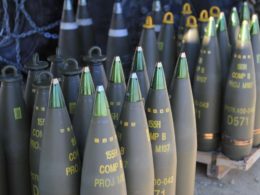On 14 November 27 EU Ministers of Defence approved the 2023 EU Capability Development Priorities based on lessons learned from Russia’s full-scale invasion of Ukraine, the European Defence Agency reported.
The document serves as a baseline for EU-wide defence planning, and all EU defence-related initiatives. According to the statement, the priorities – developed with an equal focus on short, medium, and long-term planning – aim to address both current defence gaps and future challenges.
Key priority areas include enhancing land-based precision strike capabilities, integrated air and missile defence systems, underwater warfare capabilities, sustainable logistics, and training to adapt to new threats. In particular:
- Boosting the “range, precision, and mobility of land-based precision strike capabilities” by improving ammunition stockpiles, anti-tank systems, fire support, and cyber resilience.
- In the air defence domain, priorities include upgrading current systems and developing next-generation capabilities like space-based early warning and counter-drone defences.
- Underwater warfare capabilities will also be strengthened with advanced autonomous underwater vehicles and surveillance systems.
- The priorities further emphasize logistics capabilities like shared warehouses, maintenance, and the ability to operate in extreme weather.
- Military training and education will also be boosted to adapt forces to new threats like cyberattacks.
In addition, the European Defence Agency explained which key lessons were observed in the context of Russia’s war of aggression against Ukraine. Those were the necessity for agile, mobile, interoperable, technologically advanced, energy efficient, and resilient full spectrum land forces.
“Moreover, the Ukraine context highlighted the importance of multilayer integrated air and missile defence, along with an appropriate rebalancing between the qualitative and quantitative dimensions in many capability areas,” the agency added.
On 13 November, Ukrainian Foreign Minister Dmytro Kuleba said that the European Union was unlikely to fulfil its commitment to provide Ukraine with 1 million artillery shells by March 2024. Kuleba cited issues with the EU’s defence industry capacity and bureaucratic obstacles as the key factors behind the delay.
The top Ukrainian diplomat clarified that the holdup was not due to a lack of political will within the EU. “The miserable state of the defence industry” and “a lot of unsynchronized things, a lot of bureaucracy” were more to blame, he said.
Kuleba stressed the urgency of the situation, noting that the ammunition is intended for Ukrainian infantry soldiers actively engaged in combat. He called on the EU to develop a “comprehensive policy in the field of defence industries” to fix the bureaucratic issues and ramp up production capacity.
The comments come as Russia has been able to increase its own munitions output and secure additional supplies from North Korea. Meanwhile, NATO is pushing its member states to overcome protectionist tendencies and standardize artillery caliber to boost production.
Read also:
- Sleuths find Russian forces responsible for deadly missile strike on Ukrainian pizzeria
- EU provides additional €110 million in humanitarian aid for war-affected Ukrainians
- EU will not supply 1mn rounds to Ukraine by March, foreign minister confirms
- EU prepares “plan B” as Hungary blocks € 500 mn of Ukraine aid








